张謇英文简介(中英对照)
张謇的介绍 中英文
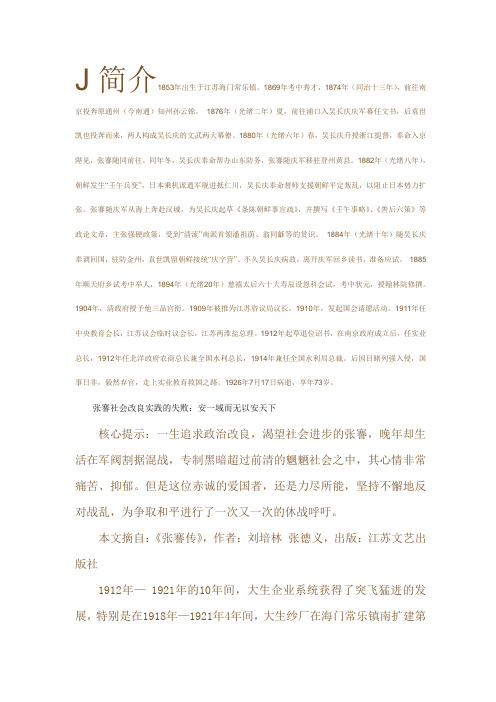
J简介1853年出生于江苏海门常乐镇。
1869年考中秀才,1874年(同治十三年),前往南京投奔原通州(今南通)知州孙云锦。
1876年(光绪二年)夏,前往浦口入吴长庆庆军幕任文书,后袁世凯也投奔而来,两人构成吴长庆的文武两大幕僚。
1880年(光绪六年)春,吴长庆升授浙江提督,奉命入京陛见,张謇随同前往。
同年冬,吴长庆奉命帮办山东防务,张謇随庆军移驻登州黄县。
1882年(光绪八年),朝鲜发生“壬午兵变”,日本乘机派遣军舰进抵仁川,吴长庆奉命督师支援朝鲜平定叛乱,以阻止日本势力扩张。
张謇随庆军从海上奔赴汉城,为吴长庆起草《条陈朝鲜事宜疏》,并撰写《壬午事略》、《善后六策》等政论文章,主张强硬政策,受到“清流”南派首领潘祖荫、翁同龢等的赏识。
1884年(光绪十年)随吴长庆奉调回国,驻防金州,袁世凯留朝鲜接统“庆字营”。
不久吴长庆病故,离开庆军回乡读书,准备应试。
1885年顺天府乡试考中举人,1894年(光绪20年)慈禧太后六十大寿辰设恩科会试,考中状元,授翰林院修撰。
1904年,清政府授予他三品官衔。
1909年被推为江苏咨议局议长。
1910年,发起国会请愿活动。
1911年任中央教育会长,江苏议会临时议会长,江苏两淮盐总理。
1912年起草退位诏书,在南京政府成立后,任实业总长,1912年任北洋政府农商总长兼全国水利总长,1914年兼任全国水利局总裁。
后因目睹列强入侵,国事日非,毅然弃官,走上实业教育救国之路。
1926年7月17日病逝,享年73岁。
张謇社会改良实践的失败:安一域而无以安天下核心提示:一生追求政治改良,渴望社会进步的张謇,晚年却生活在军阀割据混战,专制黑暗超过前清的魍魉社会之中,其心情非常痛苦、抑郁。
但是这位赤诚的爱国者,还是力尽所能,坚持不懈地反对战乱,为争取和平进行了一次又一次的休战呼吁。
本文摘自:《张謇传》,作者:刘培林张德义,出版:江苏文艺出版社1912年— 1921年的10年间,大生企业系统获得了突飞猛进的发展,特别是在1918年—1921年4年间,大生纱厂在海门常乐镇南扩建第三厂,并拟在四扬坝扩建第四厂,在天生港扩建第五厂,在东台扩建第六厂,在如皋扩建第七厂,在南通江家桥扩建第八厂,于吴淞扩建第九厂。
张謇的主要事迹的英语作文

张謇的主要事迹的英语作文He was born in Changle Town, Haimen, Jiangsu Province in 1853. In 1869, he passed the scholar, and in 1874 (the 13th year of Tongzhi), he went to Nanjing to go to Sun Yunjin, the former Tongzhou (now Nantong) governor. In the summer of 1876 (the second year of Guangxu), he went to Pukou to join the army curtain of Wu Changqing. Later, Yuan Shikai also went over to form the two major members of Wu Changqing's civil and military staff. In the spring of 1880 (the sixth year of Guangxu), Wu Changqing was appointed governor of Zhejiang province, and he was ordered to join Beijing, and Zhang Jian accompanied him. In the winter of the same year, Wu Changqing was ordered to help with the defense of Shandong, and Zhang Jian moved to Huang County, Dengzhou along with Qing's army. In 1882 (the eighth year of Guangxu), the "Renwu mutiny" took place in Korea. Japan sent warships to Incheon. Wu Changqing was ordered to supervise the troops to support Korea to pacify the rebellion to prevent the expansion of Japanese power. Zhang Jian went to Seoul from the sea with the Qing army to draft "Matters of Chen Korea" for Wu Changqing, and wrote political articles such as "Ren Wu affairs" and "Six Policies for the aftermath", and advocated tough policies, and was appreciated by Pan Zuyin and Weng Tonghe, the leaders of the southern School of "Qingliu". In 1884 (the tenth year of Guangxu), he returned to China with Wu Changqing and was stationed in Jinzhou. Yuan Shikaistayed in Korea to command the "Qingzi Ying". Soon Wu Changqing died of illness, left Qingjun to return home to study, ready to take the exam. In 1885, Shun Tianfu township test in the examination, in 1894 (Guangxu 20 years) Empress Dowager Cixi sixty birthday set enke test, the top, awarded the academician academy. In 1904, the Qing government awarded him the rank of three pin. In 1909, he was promoted as the speaker of the Jiangsu Consultative Bureau. In 1910, a congressional petition campaign was initiated. In 1911, he became president of the Central Education, head of the provisional parliament of Jiangsu Parliament, and premier of Jiangsu Huaihe Salt. In 1912, he drafted the imperial abdication edict. After the establishment of the Nanjing government, he served as the general director of industry. In 1912, he served as the general director of the Beiyang government and the general director of the National Water Conservancy, and in 1914, he served as the president of the National Water Conservancy Bureau. After witnessing the invasion of foreign powers, state affairs changed, resolutely abandoned officials, on the road of industrial education to save the country. He died on July 17,1926, at the age of 73.。
张謇英文介绍
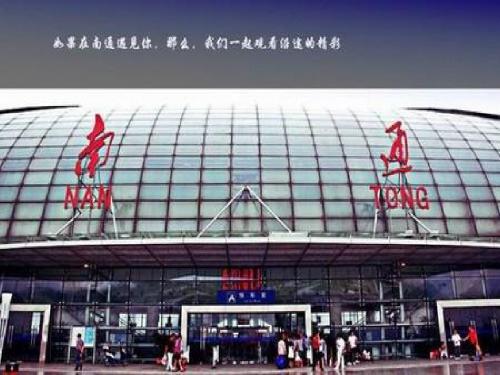
Zhangjian set up or assisted in setting up these universities.
In my hometown------
A memorial hall of Zhang
通州区西亭初级中学
There is a stele(石碑)in this school ……
(淮海实业银行)
Fuxing Flour Company
(复兴面粉公司)
Dashen Mill (大生纱厂)
The Gengsu Theatre (更俗剧院)
The Gengsu Theatre (更俗剧院)
Nantong Museum
Zhang Jian is ambitious. Not only in industry , he also made great contributions in terms of education.
Imperial Competitive Examination
(科举考试)
Number One Scholar
(状元)
Empress Dowager Cixi 1835--1908
Save the country by engaging in industry
Huaihai Industrial Bank
民国十五年 寒家自先大父少日,迁西亭之西市, 佃田于周。田俗有底面,值有故,底 折入周。周后归先府君,以畀先伯兄 与五弟。伯兄、五弟不能有,他徙而 货于宋。宋不能有,展转归于兄詧。 詧益廓宋有时之屋,以畀次孙,奉其 嫠母而居。于吾家五世矣,忽忽人世 倏百有余年。市故有木桥,桥质易朽 病行,先府君昔常举例金沙市桥诏詧、 謇曰:“吾欲为为之不能。”盖金沙 市桥易石,始清嘉庆戊寅,先府君始 生之岁也。属者丙寅,詧挈孙奠于新 屋,过市,则其西者经里人已易石, 而东且窳圮。慨然念先世之遗言,而 人子绍述之义之未尽,乃捐资为之。 嘱謇为记。既记而重为之铭曰: 宋盐官,此故亭。亘千载,沿其名。 官久废,市未更。庋两桥,横庚庚。 木易蚀,久辄倾。祖若父,市之甿。 涉斯涉,知几经。艳邻市,峨矼闳。 父有志,子勿成。奚负荷,怀屏营。 荷斯责,健者兄。舆菪菪,筑砰砰。 日而月,瞻驷星。和里老,嘤呜赓。 翼虹双,跂以峥。旅有道,市有型。 土臧心,视吾铭。
张謇英语介绍作文
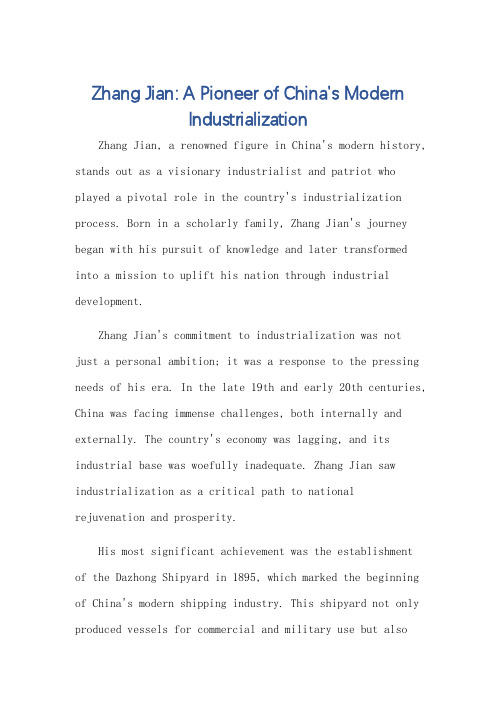
Zhang Jian: A Pioneer of China's ModernIndustrializationZhang Jian, a renowned figure in China's modern history, stands out as a visionary industrialist and patriot who played a pivotal role in the country's industrialization process. Born in a scholarly family, Zhang Jian's journey began with his pursuit of knowledge and later transformed into a mission to uplift his nation through industrial development.Zhang Jian's commitment to industrialization was notjust a personal ambition; it was a response to the pressing needs of his era. In the late 19th and early 20th centuries, China was facing immense challenges, both internally and externally. The country's economy was lagging, and its industrial base was woefully inadequate. Zhang Jian saw industrialization as a critical path to nationalrejuvenation and prosperity.His most significant achievement was the establishmentof the Dazhong Shipyard in 1895, which marked the beginning of China's modern shipping industry. This shipyard not only produced vessels for commercial and military use but alsotrained a generation of skilled workers, laying the foundation for China's future industrial growth. ZhangJian's foresight and perseverance in this endeavor were commendable, as he faced numerous challenges, including financial constraints and technological limitations.Beyond industrialization, Zhang Jian was also deeply involved in social reform and education. He believed that education was the key to enhancing the nation'sintellectual and moral capabilities. Therefore, he founded numerous educational institutions, including the Nantong University, to provide access to quality education for a broader segment of the population.Zhang Jian's legacy is not just about his industrial and educational achievements; it's also about his spirit of patriotism and dedication to the welfare of the nation. He believed that every individual had a responsibility to contribute to the progress and prosperity of their country. This belief was reflected in his tireless efforts to promote industrialization, modernize agriculture, and improve social welfare.Today, Zhang Jian remains a role model for many in China and beyond. His story is a reminder of the importance of vision, perseverance, and dedication in building a strong and prosperous nation. His achievements are not just historical milestones; they are also an inspiration for future generations to continue the journey of national rejuvenation and progress.**张謇:中国现代化工业化的先驱**张謇,中国现代史上的一位杰出人物,他以远见卓识的工业家和爱国者的身份,在中国的工业化进程中发挥了关键作用。
伟大的人张骞英语作文

伟大的人张骞英语作文Zhang Qian was a remarkable figure in ancient China, renowned for his daring explorations and diplomatic missions that opened up the Silk Road. His journeys across vast, uncharted lands were not just about trade but also about cultural exchange and understanding.Born in the Han Dynasty, Zhang Qian was a man of vision and courage. He embarked on his first mission to the Western Regions in 138 BCE, a time when the empire sought toestablish alliances to counter the threat of the Xiongnu. His travels were fraught with danger, yet he persevered, paving the way for future trade and communication.The legacy of Zhang Qian is not just in the tangible connections he established but also in the intangible bridges he built between cultures. His encounters with various tribes and kingdoms led to the exchange of ideas, art, and technology, enriching the world in ways that still resonate today.Despite the hardships he faced, including capture and years of imprisonment, Zhang Qian's spirit of exploration never wavered. His unwavering determination to fulfill his mission is a testament to his character and the importance he placed on his role as a diplomat and explorer.His contributions to history are immeasurable. ZhangQian's name is synonymous with the Silk Road, a network of trade routes that connected the East and West, fostering economic prosperity and cultural diversity. His life's work stands as a beacon of human achievement, a reminder of what can be accomplished through perseverance and vision.In the annals of history, Zhang Qian is remembered not only for his voyages but also for the spirit of discovery he embodied. His life serves as an inspiration to all who seek to explore new horizons and to forge connections that transcend borders and boundaries.The impact of Zhang Qian's travels is still felt today. The Silk Road, once a conduit for silk and spices, has become a symbol of global interconnectedness. It is a reminder that the world is not a collection of isolated entities but a tapestry woven from the threads of many cultures and histories.In conclusion, Zhang Qian's story is one of courage, vision, and the indomitable human spirit. His life teaches us that no obstacle is insurmountable and that the pursuit of knowledge and understanding can lead to great achievements. His legacy continues to inspire us to reach out across the divides that separate us, in the pursuit of a more connected and enlightened world.。
介绍张謇的英文作文
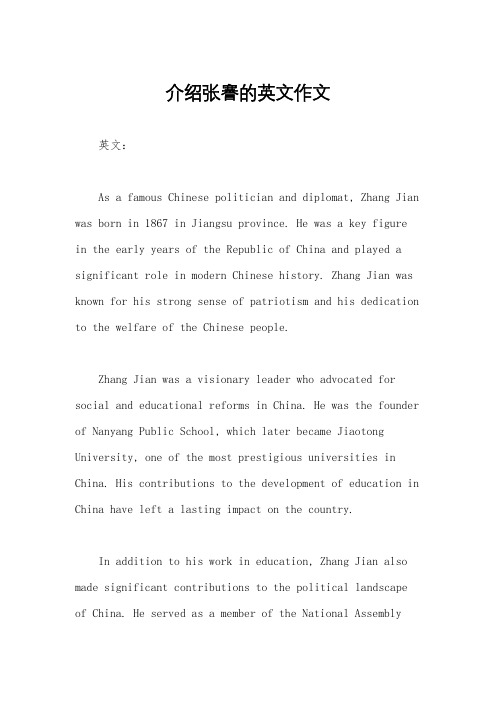
介绍张謇的英文作文英文:As a famous Chinese politician and diplomat, Zhang Jian was born in 1867 in Jiangsu province. He was a key figurein the early years of the Republic of China and played a significant role in modern Chinese history. Zhang Jian was known for his strong sense of patriotism and his dedication to the welfare of the Chinese people.Zhang Jian was a visionary leader who advocated for social and educational reforms in China. He was the founder of Nanyang Public School, which later became Jiaotong University, one of the most prestigious universities in China. His contributions to the development of education in China have left a lasting impact on the country.In addition to his work in education, Zhang Jian also made significant contributions to the political landscape of China. He served as a member of the National Assemblyand was appointed as the Minister of Foreign Affairs. His diplomatic skills and leadership qualities were highly regarded by his peers and he was instrumental in negotiating treaties and agreements with foreign powers.Zhang Jian's legacy continues to inspire and influence people in China and around the world. His commitment to the betterment of society and his unwavering dedication to the Chinese people have earned him a place in history as a respected and revered figure.中文:张謇是一位著名的中国政治家和外交家,他出生于1867年江苏省。
介绍张謇的英文作文
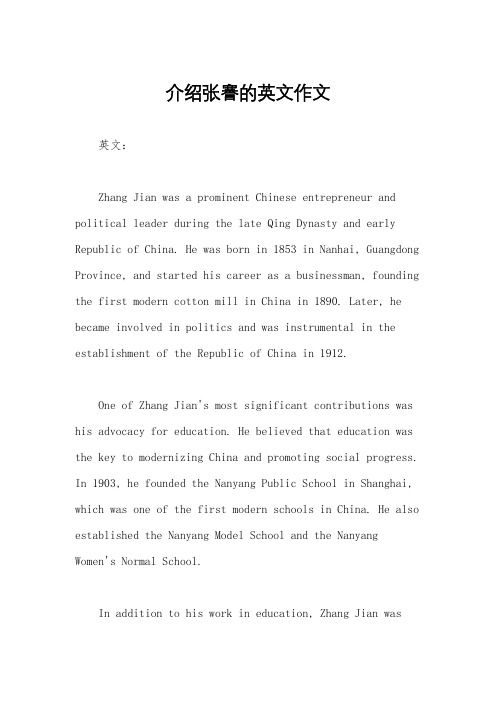
介绍张謇的英文作文英文:Zhang Jian was a prominent Chinese entrepreneur and political leader during the late Qing Dynasty and early Republic of China. He was born in 1853 in Nanhai, Guangdong Province, and started his career as a businessman, founding the first modern cotton mill in China in 1890. Later, he became involved in politics and was instrumental in the establishment of the Republic of China in 1912.One of Zhang Jian's most significant contributions was his advocacy for education. He believed that education was the key to modernizing China and promoting social progress. In 1903, he founded the Nanyang Public School in Shanghai, which was one of the first modern schools in China. He also established the Nanyang Model School and the Nanyang Women's Normal School.In addition to his work in education, Zhang Jian wasalso involved in various political and social organizations. He served as a member of the National Assembly and was a founding member of the Progressive Party. He was also a philanthropist and donated generously to various causes, including disaster relief and the establishment ofhospitals and libraries.Overall, Zhang Jian was a visionary leader who playedan important role in the modernization of China. His contributions to education and social progress continue to be felt today.中文:张謇是清末民初时期著名的中国企业家和政治家。
张謇英语介绍作文
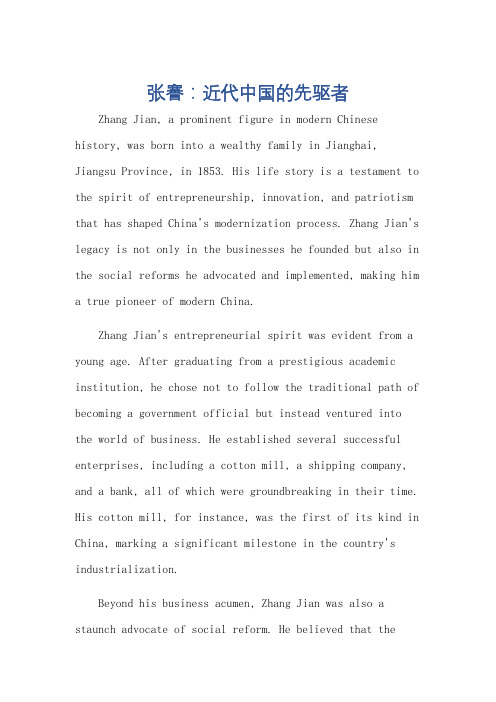
张謇:近代中国的先驱者Zhang Jian, a prominent figure in modern Chinese history, was born into a wealthy family in Jianghai, Jiangsu Province, in 1853. His life story is a testament to the spirit of entrepreneurship, innovation, and patriotism that has shaped China's modernization process. Zhang Jian's legacy is not only in the businesses he founded but also in the social reforms he advocated and implemented, making him a true pioneer of modern China.Zhang Jian's entrepreneurial spirit was evident from a young age. After graduating from a prestigious academic institution, he chose not to follow the traditional path of becoming a government official but instead ventured into the world of business. He established several successful enterprises, including a cotton mill, a shipping company, and a bank, all of which were groundbreaking in their time. His cotton mill, for instance, was the first of its kind in China, marking a significant milestone in the country's industrialization.Beyond his business acumen, Zhang Jian was also a staunch advocate of social reform. He believed that theprosperity of a nation depended not only on economic growth but also on the well-being of its people. To this end, he dedicated himself to improving education, healthcare, and infrastructure in his hometown. He established schools, hospitals, and public works projects, all of which significantly improved the quality of life for the people of Jianghai.Zhang Jian's patriotism was also evident in his support for the reform movement in late Qing Dynasty China. He believed that China needed to modernize to catch up with the rest of the world and that this could only be achieved through widespread social and political reforms. Heactively participated in the Hundred Days' Reform, a failed attempt to modernize the Qing Dynasty, and continued to advocate for reform even after its failure.Zhang Jian's legacy is not just in the businesses he founded or the social reforms he implemented. It is also in the spirit he embodied: a spirit of entrepreneurship, innovation, and patriotism that has inspired generations of Chinese to pursue their dreams and contribute to thenation's progress. His life story is a powerful reminderthat anyone, regardless of their background or circumstances, can make a significant impact on society if they are willing to take risks, innovate, and serve the greater good.**张謇:近代中国的先驱者**张謇,这位近代中国历史上的杰出人物,于1853年出生于江苏江海的一个富裕家庭。
- 1、下载文档前请自行甄别文档内容的完整性,平台不提供额外的编辑、内容补充、找答案等附加服务。
- 2、"仅部分预览"的文档,不可在线预览部分如存在完整性等问题,可反馈申请退款(可完整预览的文档不适用该条件!)。
- 3、如文档侵犯您的权益,请联系客服反馈,我们会尽快为您处理(人工客服工作时间:9:00-18:30)。
Zhang jian is Late Qing dynasty schola ,China famous modern industrialists, educators, advocates "industrial national salvation.
张謇是清末状元,中国近代著名的实业家、教育家,主张“实业救国”。
He started life more than 20 enterprise, more than 370 school for our modern national industry, the rise of the development of the cause of education, to make a valuable contribution, called the "top industrialists". Chairman MAO when it comes to China's national industry once said: "light industry can't forget the zhang jian“.
他一生创办了20多个企业,370多所学校,为我国近代民族工业的兴起,为教育事业的发展作出了宝贵贡献,被称为“状元实业家”。
毛泽东同志在谈到中国民族工业时曾说:“轻工业不能忘记南通的张謇”。
Thirty-one years guangxu period (1905), he established the first domestic in tongzhou, nantong museum garden museum.
光绪三十一年(1905年),他在通州建立了国内第一所博物馆——南通博物苑
Zhang Jian (politician)
Zhang Jian (Chinese:张謇; 1853 - 1926), courtesy name Jizhi (季直), sobriquet Se'an (啬庵), was a Chinese entrepreneur, politician and educationist.
Biography
Zhang was born in Haimen County, Jiangsu Province in 1853. He took the Imperial Examinations of Qing Dynasty and attained Zhuangyuan, or exemplar of state in 1894, and subsequently served in Hanlin Academy.
In 1909, Zhang was elected the chairman of Jiangsu provincial parliament. In 1912, Zhang drafted the Abdication Edict for Puyi, the last emperor of China. He was appointed as the Minister of Enterprise of the temporary government of the Republic of China. In 1913, Zhang became the Minister of Industry and Commerce and Minister of Agriculture and Forestry in Beiyang Government. In 1914, he served as the director of the State Administration of Water Resources. Achievements
Zhang founded the first normal school in modern China, Nantong Normal College. He established the first private museum of China, Nantong museum.
The ideal he advocated, "Enterprise as Father, Education as Mother", has a profound impact on Chinese history. In his life, he founded over 20 companies, and over 370 schools, and made a significant contribution to the industrialization and education of modern China.
Zhang Jian, Wade-Giles romanization Chang Chien(born July 1, 1853, Haimen, Jiangsu province, China—died August 24, 1926, Nantong, Jiangsu), a leading social
reformer and industrial entrepreneur in early 20th-century China.
Zhang received a traditional Confucian education, and in 1894 he passed the top level of the civil service examination. The following year China was defeated in the Sino-Japanese War, and Zhang retired from office to develop industry in his native Jiangsu and make it an example of modernization for all of China. With government encouragement and tax benefits, he built the famous Dasheng (Dah Sun) Cotton Mill, which became the only ... (100 of 211 words)。
